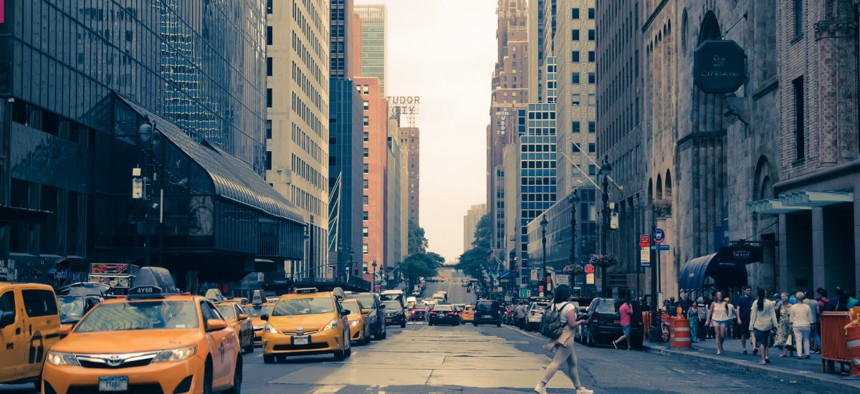Connecting state and local government leaders
A concept for AV expressways promises to reduce travel times, but falls into an old trap of car-centric planning.
New York City traffic has never been a relaxing experience. But over the past few years, a hobbled subway system and a massive influx of Ubers and Lyfts has made the situation even worse. The same has happened in other cities, including San Francisco and Seattle, causing politicians and citizens to point fingers at the transportation network companies. Yet these very same companies promise to deliver cities from their traffic woes in just a few short years with fleets of shared autonomous vehicles.
A new proposal from the architecture and engineering firm Edg envisions how New York City’s infrastructure might change to accommodate that vision. It also sheds light on the temptations that might sway planners away from human-centered urban design and back toward more modernist, auto-centric practices in the age of autonomous vehicles.
Loop NYC, as the proposal is known, would create one lane in each direction dedicated to self-driving cars on the highways that outline Manhattan: the West Side Highway and F.D.R. Drive. It would also turn several major cross streets into expressways for autonomous vehicles, adding pedestrian overpasses to keep people off the streets. These self-driving superblocks would form “loops” around Manhattan, efficiently circulating autonomous vehicles throughout the city, eventually including private, shared, and public vehicles, according to John J. Meyer, a designer at Edg. These changes could result in dramatically decreased travel times, the proposal claims. According to their calculations, the trip from Grand Central Station to Battery Park and back would take just 11 minutes, compared to 40 minutes today.

Once autonomous vehicles are widely in use, most vehicular traffic would be funneled into these loops, allowing other streets to be converted into recreational space or bikeways. The proposal describes a linear park along Broadway from the Battery to Union Square, which would then bifurcate, continuing the length of Park Avenue on the east side, and along Broadway on the west, where large sections have already been converted to pedestrian-only space.
Of course, this plan is entirely hypothetical. There is in fact remarkably little agreement as to how autonomous vehicles will integrate into the existing urban fabric. Jacob Mason, a transportation researcher at the Institute for Transportation and Development Policy, says it’s still not clear that self-driving cars will lead to a decrease in vehicles on the road, or to improved travel times, particularly in urban areas. “If you reduce travel times by self-driving cars, then more people will use self-driving cars and fill up the available space,” he says. “With no monetary incentive not to fill up that space, I don’t see why [these express lanes] wouldn’t be just as congested as everywhere else.”
Instead, he suggests prioritizing the forms of transportation that pack in the most travelers in the least amount of space. “If you’re thinking of creating a network of lanes to prioritize one mode over the other, the obvious choice is to create a network of bus lanes,” Mason says. Presumably, the express lanes described in the Loop NYC plan could work just as well for buses, self-driving or not.
Eric Goldwyn, a postdoctoral fellow at NYU’s Marron Institute of Urban Management, says giving autonomous vehicles their own right of way might be the right idea, but he’s not convinced just yet. “If you look at any transportation technology, they are most optimal when they have their own dedicated piece of infrastructure,” like bike lanes or subway tunnels, he says. “For autonomous vehicles, I don’t know if anyone has made a compelling argument for what that piece of infrastructure is going to be.”

The biggest concern with the plan, Mason and Goldwyn say, is the reliance on pedestrian overpasses, which are key to the self-driving expressway concept. In a situation where all vehicles on the road are autonomous, they would be able to communicate with each other so they rarely have to stop at intersections—except when pedestrians enter the mix.
But past attempts have proven that forcing pedestrians on to overpasses and underpasses is a bad idea. They greatly increase pedestrian travel times and are extremely expensive and space-intensive, especially when they’re made accessible to people with disabilities. Inevitably, without authoritarian style barricades or “electric fences,” as Mason jokingly suggests, people will cross at street-level anyway.
Autonomous vehicles are all about greater efficiency, so it figures that urban designs conceived around this new technology would seek to maximize that efficiency. As infrastructure in American cities deteriorates, it’s easy to understand the desire for drastic solutions from the latest technologies. While Loop NYC feels quotidian compared to some recent proposals from Elon Musk, it comes from a similar place of impatience with the status quo. “This began as an idea for the NYC Driverless Future competition,” Meyer writes, “but was further fueled by the environment of frustration the city residents are currently enduring. We are clearly due for some major changes.”
Loop NYC is indeed an important conversation starter, indicating that cities need to think more seriously about how to integrate self-driving car infrastructure into the existing urban fabric. From Uber to bike share, city dwellers have demonstrated a remarkable openness to new transportation modes in recent years, suggesting that when the robo-cars arrive, people will use them. As the current traffic crisis indicates, however, new transportation technologies may not seamlessly mesh with everything that’s already on the street.
As long as they share the road with pedestrians, bikes, and human-driven vehicles, self-driving cars will not be able to reach their full utility. The question is, what would cities have to sacrifice to unlock that utility?
“I think what’s important is articulating what our values are, and what we think our cities should look like,” Goldwyn says. “If I see something that’s going to make it worse for pedestrians, then no matter what the solution is, I’m going to say no, that’s a bad idea.”
The self driving revolution, if that is what it becomes, will need to be planned. But those plans should make multi-modal transportation more accessible and appealing, instead of returning to auto-centric visions of the past.
Benjamin Schneider is an editorial fellow at CityLab where this article was originally published.

NEXT STORY: Agencies explore AI, IoT integration



